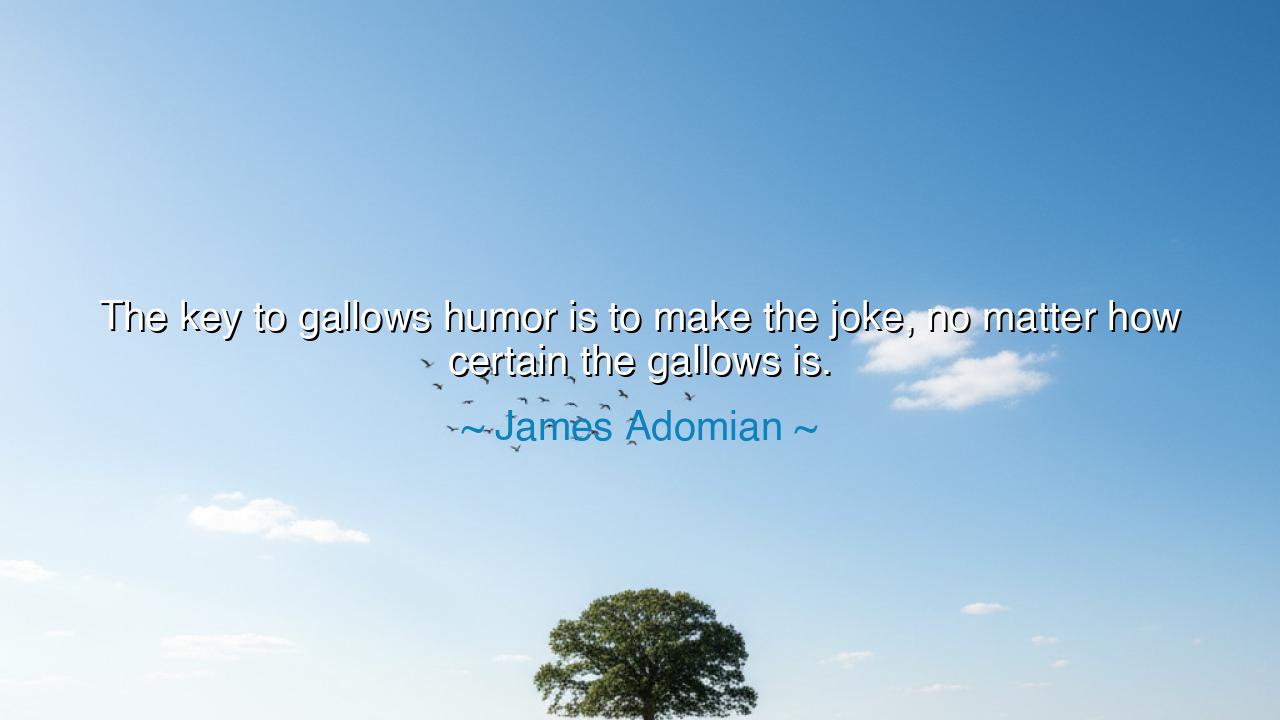
The key to gallows humor is to make the joke, no matter how






“The key to gallows humor is to make the joke, no matter how certain the gallows is.”
Thus spoke James Adomian, the jester who peers into darkness and still finds the strength to laugh. In this powerful saying, he reveals the essence of courage, not the kind wielded by warriors with swords, but the quiet defiance of the spirit that meets despair with a smile. His words are not about humor alone — they are about the triumph of the human soul in the face of inevitability. For to laugh when doom is certain, to jest when hope seems gone, is to proclaim: “I am still free.”
The “gallows”, that ancient symbol of fate and finality, stands for the moments in life when all appears lost — when fear, pain, or death itself waits before us. Yet Adomian tells us that even here, one must make the joke. Why? Because the act of laughter, when all else is stripped away, becomes an act of rebellion. It says to the universe: “You may take my body, but not my wit; you may silence my breath, but not my humor.” It is the last fortress of the mind — the refusal to surrender dignity, identity, and humanity. Gallows humor is not cynicism; it is valor disguised as laughter.
The ancients, too, knew the sanctity of such laughter. The philosopher Socrates, condemned to drink poison for speaking truth, spent his final hours in conversation, making witty remarks about his impending death. His companions wept, but Socrates smiled — for he had already conquered fear through humor and insight. When asked if he had any final words, he jested about the debt of a rooster to Asclepius, the god of healing — a symbol that even death was but another cure for the ills of mortal life. Thus, like Adomian, he knew that to laugh before the gallows is not denial, but understanding. It is the soul’s way of standing upright even as the world falls.
Throughout history, gallows humor has appeared wherever suffering has been deepest. Soldiers in the trenches of war joked about their rations and their fate. Prisoners in the darkest cells found strength in sharing absurdities about their captors. Doctors and nurses, facing death daily, make quiet jokes not out of cruelty, but to keep their spirits alive. This is the wisdom Adomian channels — that laughter in the shadow of doom is not frivolity but survival. It is the spark that keeps the human heart from freezing. For as long as one can laugh, one is not defeated.
Consider the story of Viktor Frankl, the psychiatrist who endured the horrors of a Nazi concentration camp. Amid starvation, disease, and despair, he found that humor was one of the last freedoms no tyrant could take. He once recounted how he and a friend would invent imaginary stories about life after liberation — laughing as though they were already free. “Humor,” Frankl wrote, “was another of the soul’s weapons in the fight for self-preservation.” It lightened the unbearable burden, if only for a moment, and that moment was enough to endure another day. So too does Adomian’s wisdom remind us: the joke is not to escape reality, but to rise above it.
The origin of Adomian’s insight lies in his own craft — the art of comedy, which has always been born from tension, pain, and contradiction. To make people laugh about the things that frighten them most — injustice, mortality, absurdity — is to give them back their power. When he says, “make the joke, no matter how certain the gallows is,” he is teaching not only comedians, but all souls: do not let fear silence your truth. Humor is not merely entertainment; it is the cry of freedom disguised as laughter, the last word of those who refuse to be broken.
So let this be the lesson carried from James Adomian’s words:
-
When darkness comes, make the joke. Laughter is the light that cannot be extinguished.
-
Do not fear the gallows, for fear is the executioner’s truest weapon.
-
Use humor as armor, not to deny pain, but to transform it into courage.
-
Remember that laughter is strength, the heartbeat of defiance, the music of the unbroken.
Thus spoke James Adomian, and through him echoes the ancient wisdom of all who have faced the abyss with a smile. For to laugh in the shadow of the gallows is to prove that the spirit still breathes, that the mind still belongs to itself, that even at the edge of despair, the human heart remains unconquered. So, O listener, when you stand before your own gallows — whether of loss, fear, or failure — remember this: make the joke. For in that laugh, you rise higher than death, and claim once more the indomitable power of being human.






AAdministratorAdministrator
Welcome, honored guests. Please leave a comment, we will respond soon